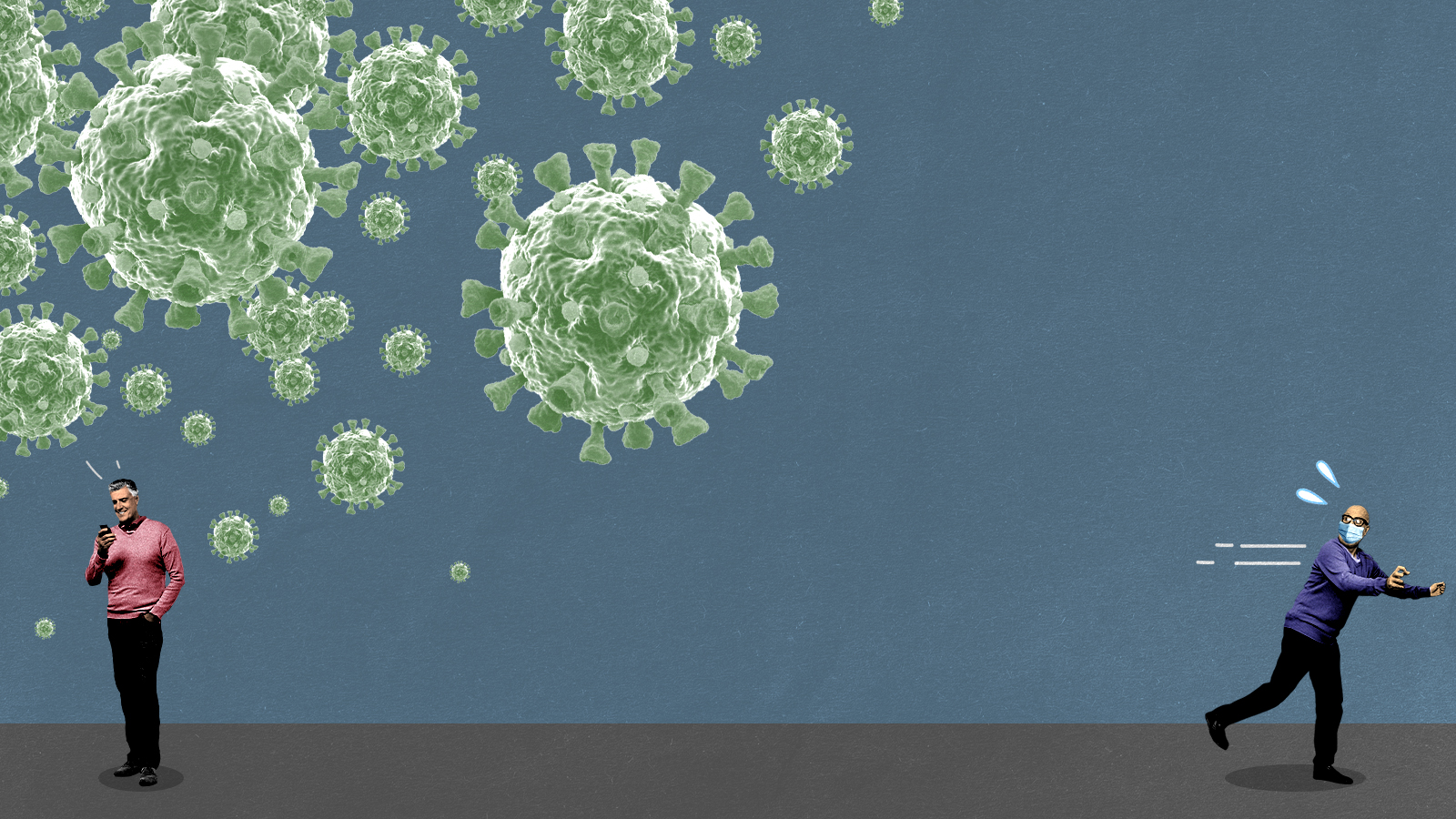The fundamentally irrational American response to COVID-19


A free daily email with the biggest news stories of the day – and the best features from TheWeek.com
You are now subscribed
Your newsletter sign-up was successful
Imagine a country facing a pandemic.
In this make-believe country, it quickly becomes obvious that some types of people become severely ill, with some dying of the virus and others developing a "long" version of the disease that lasts for months. Other people, though, only experience ordinary cold or mild flu-like symptoms and recover quickly. Before long, researchers develop a simple blood test to determine which people are in which group. Soon, nearly everyone knows their own risk of severe sickness — and yet those more likely to get seriously ill refuse to take rudimentary precautions to prevent infection while people at much lower risk go to the other extreme, insisting on rules requiring face masks in public and regulating daily life in myriad other ways to protect themselves still further.
You'd probably conclude that the behavior of this imaginary country's population is fundamentally irrational, and you would be right. That is unfortunate, because with just a slight factual adjustment, this country is us. Instead of a miraculous test that determines which people are naturally predisposed to becoming severely or mildly ill, though, we have vaccines that place people into one or the other category. The vaccinated are, in the overwhelming majority of cases, protected from dangerous symptoms if they contract COVID-19, while the unvaccinated are not. Yet a recent Morning Consult poll cited by The New York Times' David Leonhardt shows that the unvaccinated are significantly less worried about catching the virus than the vaccinated.
The Week
Escape your echo chamber. Get the facts behind the news, plus analysis from multiple perspectives.

Sign up for The Week's Free Newsletters
From our morning news briefing to a weekly Good News Newsletter, get the best of The Week delivered directly to your inbox.
From our morning news briefing to a weekly Good News Newsletter, get the best of The Week delivered directly to your inbox.
Now, as Matthew Yglesias pointed out in a tweet, there is a way to force this combination of opinions into a kind of coherence if we flip the causality and assume the poll is showing that those most "worried about COVID get vaccinated and boosted," while those less worried do not. But in that case, the poll merely highlights a somewhat different mode of irrationality — namely, that of people who get vaccinated to protect themselves from the virus and yet demonstrate through their behavior that they don't really believe the vaccines work. The irrationality of the unvaccinated, meanwhile, is based on a more extreme version of the same suspicion: In addition to doubting the efficacy of the vaccines, they also believe receiving the shot is riskier than doing unvaccinated battle against the virus.
What does the future hold for a country so awash in epidemiological irrationality? It will all depend on the future course of the virus. If the widespread reach of the (less severe) Omicron variant combined with vaccine immunity ends up standing in the way of the next variant's spread, maybe the country can get back to normal.
But if the next variant eludes some of this immunity, the U.S. will likely continue on its current, unhappy path — with those at greatest risk pursuing the riskiest behavior and the least at risk clinging to public-health regulations that stand in the way of returning to normal. It won't take an imaginary scenario to see our foolishness then.
A free daily email with the biggest news stories of the day – and the best features from TheWeek.com
Damon Linker is a senior correspondent at TheWeek.com. He is also a former contributing editor at The New Republic and the author of The Theocons and The Religious Test.
-
 Why are election experts taking Trump’s midterm threats seriously?
Why are election experts taking Trump’s midterm threats seriously?IN THE SPOTLIGHT As the president muses about polling place deployments and a centralized electoral system aimed at one-party control, lawmakers are taking this administration at its word
-
 ‘Restaurateurs have become millionaires’
‘Restaurateurs have become millionaires’Instant Opinion Opinion, comment and editorials of the day
-
 Earth is rapidly approaching a ‘hothouse’ trajectory of warming
Earth is rapidly approaching a ‘hothouse’ trajectory of warmingThe explainer It may become impossible to fix
-
 A Nipah virus outbreak in India has brought back Covid-era surveillance
A Nipah virus outbreak in India has brought back Covid-era surveillanceUnder the radar The disease can spread through animals and humans
-
 Covid-19 mRNA vaccines could help fight cancer
Covid-19 mRNA vaccines could help fight cancerUnder the radar They boost the immune system
-
 The new Stratus Covid strain – and why it’s on the rise
The new Stratus Covid strain – and why it’s on the riseThe Explainer ‘No evidence’ new variant is more dangerous or that vaccines won’t work against it, say UK health experts
-
 RFK Jr. vaccine panel advises restricting MMRV shot
RFK Jr. vaccine panel advises restricting MMRV shotSpeed Read The committee voted to restrict access to a childhood vaccine against chickenpox
-
 RFK Jr. scraps Covid shots for pregnant women, kids
RFK Jr. scraps Covid shots for pregnant women, kidsSpeed Read The Health Secretary announced a policy change without informing CDC officials
-
 New FDA chiefs limit Covid-19 shots to elderly, sick
New FDA chiefs limit Covid-19 shots to elderly, sickspeed read The FDA set stricter approval standards for booster shots
-
 RFK Jr.: A new plan for sabotaging vaccines
RFK Jr.: A new plan for sabotaging vaccinesFeature The Health Secretary announced changes to vaccine testing and asks Americans to 'do your own research'
-
 Five years on: How Covid changed everything
Five years on: How Covid changed everythingFeature We seem to have collectively forgotten Covid’s horrors, but they have completely reshaped politics
